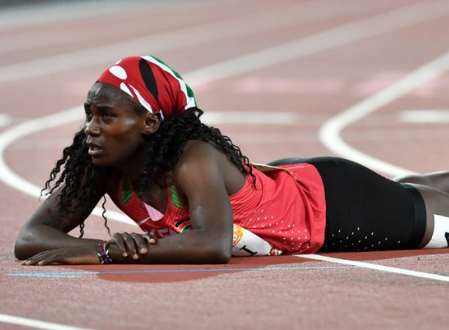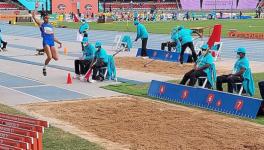Testosterone Claims Two More Victims After Caster Semenya

Maximilla Imali, Kenya’s 400m record holder, is not new to controversy and was forced out of the 2015 IAAF World Championships when a blood test showed she had hyperandrogenism (Pic: Twitter).
Less than 10 days after the Court of Arbitration for Sport (CAS) ruled against Caster Semenya and the Differences of Sex Development (DSD) rule, Kenya has dropped two athletes from their team for the World Relay Championships citing high testosterone as an issue.
After the ruling (which came into effect from May 8) the International Association of Athletics Federations (IAAF) mandates that female athletes with higher testosterone than normal (for women, 0.12 to 1.79 nanomoles/litre of testosterone per liter of blood; for men, 7.7 to 29.4 nanomoles/litre) would have to take suppressants to bring it down to 5 nanomoles/litre (the prescribed limit) to compete internationally.
Also Read | Caster Semenya vs IAAF: CAS Ruling a Case of Protecting Majority By Targeting the Minority
Athletics Kenya director of competitions Paul Mutwii cited the IAAF’s decision in explaining why the team dropped Maximila Imali and Evangeline Makena from the team. This could be the first of many repercussions that is likely to hit the athletics universe in the coming months.
“Now that the most powerful authority in international sports has decreed that women with high testosterone levels cannot compete in certain events unless they take hormone suppressants”, Mutwii said, “We could not risk traveling with the two athletes.”
Imali, 23, holds Kenya’s record in the 400 metres and was sidelined at the IAAF World Championships in 2015 when a blood test showed she had hyperandrogenism (produces more testosterone than the average female).
“We were summoned for the blood tests at the team hotel last Friday and when the report came out on Monday, Athletics Kenya officials informed us about the result outcome,” Imali said.
“This is a scheme to demoralise us. I am not ready to quit athletics, nor to take a suppressant treatment. I am so happy the way God made me to be,” she added.
Also Read | Jithin Paul vs NADA: Doping and the Indian Athlete
Criticism for the IAAF has been widespread, with various athletes across disciplines banding together to point out the discriminatory nature of the ruling. Several have pointed out how athletic prowess due to physical advantage is common across various disciplines of sport.
“I know that the IAAF’s regulations have always targeted me specifically,” Semenya bravely said in the aftermath of the ruling. “For a decade, the IAAF has tried to slow me down, but this has actually made me stronger. The decision of the CAS will not hold me back.”
Get the latest reports & analysis with people's perspective on Protests, movements & deep analytical videos, discussions of the current affairs in your Telegram app. Subscribe to NewsClick's Telegram channel & get Real-Time updates on stories, as they get published on our website.
























